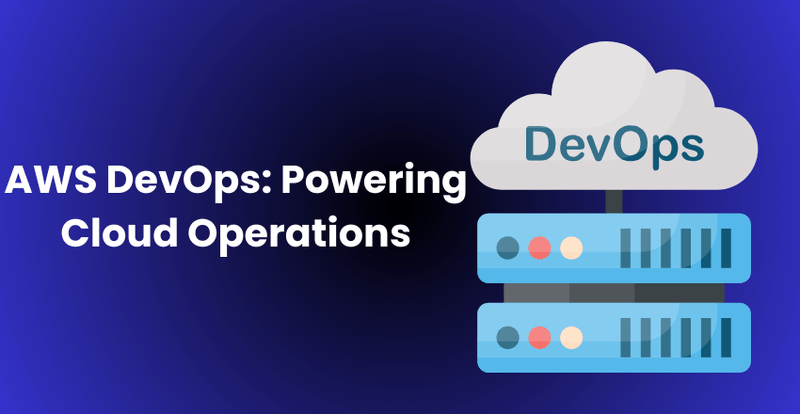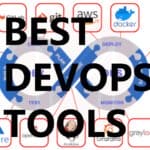
AWS DevOps Powering Cloud Operations isn’t just a tool; it’s a complete ecosystem. With services like AWS CodePipeline and AWS CloudFormation, it offers an end-to-end solution for cloud-native development. The result? Unprecedented efficiency, scalability, and a competitive edge in today’s digital landscape.
Amazon Web Services (AWS) has changed how organizations handle infrastructure and app deployment. AWS DevOps automates the software delivery process. This speeds up releases, cuts failure rates, and boosts teamwork.
This method lets businesses adapt to market shifts quickly. They can scale operations and stay competitive in a fast digital world.
AWS DevOps benefits go beyond just software and operations. It also optimizes cloud activities and gives better control over infrastructure. This results in higher productivity, lower costs, and more business agility. AWS DevOps helps organizations maximize their cloud benefits, grow faster, and outpace rivals.
Unlock Limitless Potential with AWS DevOps
AWS DevOps is essential for businesses aiming to boost productivity and optimize cloud activities. It automates workflows and cuts out software development inefficiencies. This speeds up the launch of new products and services.
The outcome? A nimble, competitive business ready to adapt to changing market demands.
Optimizing Cloud Operations with AWS DevOps
AWS DevOps makes scaling cloud operations easy. It offers a fast, efficient platform for app delivery. It uses continuous integration, delivery, and deployment for quick market response.
It also offers a range of DevOps tools and services. These include AWS CodePipeline, AWS CodeDeploy, and AWS CloudFormation. These tools help create and deploy robust, scalable cloud apps.
Using AWS DevOps boosts productivity and cuts costs. It speeds up business growth and keeps you competitive in the cloud market.
DevOps Practices in AWS: A Winning Combination
DevOps in AWS offers multiple strategies for success. These include team integration, process automation, and continuous code deployment. These steps boost cloud efficiency, productivity, and growth.
Automation is a key element. It streamlines build, test, and deployment processes. This improves efficiency and speeds up code deployment.
Infrastructure as code is another crucial aspect. It allows for version control and automated resource management. This simplifies operations, cuts errors, and enhances scalability.
Integration of Dev and Ops Teams
One of the most significant benefits of DevOps practices in AWS is the integration of development and operations teams. This approach breaks down the traditional silos between these departments and fosters collaboration, communication, and shared responsibility. By working together, these teams can identify and address issues more quickly, resulting in faster time to market and improved customer experiences.
Continuous Integration and Deployment
Continuous integration and deployment are critical components of DevOps practices in AWS. By automating the build, test, and deployment process, organizations can deliver code changes to customers faster and more frequently. This approach also enables teams to detect and address issues earlier in the development process, reducing the risk of errors or bugs in production.
AWS DevOps Tools
Implementing DevOps practices in AWS requires the use of specialized tools and services. AWS provides a range of services to support DevOps, including AWS CodePipeline, AWS CodeDeploy, and AWS CloudFormation. These tools help organizations to automate the development and deployment process, implement infrastructure as code, and monitor and manage cloud resources.
Overall, DevOps practices in AWS offer a winning combination for businesses looking to transform their cloud operations. By leveraging automation, collaboration, and AWS tools, organizations can streamline processes, increase productivity, and accelerate growth.
Cloud-Native DevOps on AWS: A Synergistic Approach
Cloud-native DevOps on AWS is a potent mix. It helps build scalable, resilient, and efficient cloud apps. AWS services like Lambda and EC2 offer various tools for growth.
A key benefit is infrastructure as code. It manages both infrastructure and app deployment. Teams can version and track this code. This leads to reliable, error-free deployments.
Automated testing is another crucial feature. Tools like AWS CodeBuild allow for easy testing. This catches issues early, saving time and resources later.
Example: Deploying a Cloud-Native Application on AWS
Suppose an organization wants to deploy a cloud-native application on AWS using the serverless architecture. They can leverage AWS Lambda, a compute service that runs code in response to events, to achieve this goal.
The first step would be to write the application’s code and package it as a deployment package. Once this is done, the code can be uploaded to AWS Lambda, which will automatically handle the provisioning and scaling of the compute resources needed to run the application.
The organization can then use AWS API Gateway to expose the Lambda function as a RESTful API endpoint. This allows external users to interact with the application, triggering the Lambda function and receiving the application’s output.
By using Lambda and API Gateway in combination, organizations can build highly scalable and resilient applications that are cost-effective and easy to manage.
Overall, cloud-native DevOps on AWS is a synergistic approach that provides numerous benefits for organizations looking to optimize their cloud operations, increase productivity, and drive growth. By leveraging the power of AWS services like Lambda and EC2, businesses can build and deploy cloud-native applications with ease, providing a competitive advantage in today’s fast-paced digital landscape.
Leveraging AWS Services for DevOps Success
Implementing DevOps practices in the AWS environment requires leveraging the appropriate services to streamline operations, increase productivity, and accelerate growth. AWS offers a range of services specifically designed to support DevOps teams and processes, including:
| AWS Service | Description |
|---|---|
| AWS CodePipeline | Automates the release process for software updates, enabling fast and reliable deployments. |
| AWS CodeDeploy | Automates software deployments to a variety of compute services, including Amazon EC2, AWS Fargate, and Lambda. |
| AWS CloudFormation | Enables the creation and management of infrastructure as code, making it easy to create and provision AWS resources. |
| AWS Elastic Beanstalk | Automates the deployment and scaling of web applications, simplifying the management of infrastructure and application code. |
By utilizing these AWS services, teams can reduce manual processes, minimize errors, and increase efficiency. AWS also offers the flexibility to integrate with other DevOps tools and platforms, empowering teams to build and deploy their applications using the tools that best fit their unique needs and workflows.
Scaling DevOps on AWS: Challenges and Solutions

As organizations continue to adopt DevOps practices on AWS, they may encounter challenges in scaling these practices to support business growth. These challenges can include:
- Managing increased infrastructure complexity
- Ensuring consistent code deployment
- Implementing effective monitoring and logging at scale
- Maintaining security and compliance
Fortunately, there are solutions to these challenges that can help organizations successfully scale DevOps practices on AWS:
- Utilize infrastructure as code to manage and automate infrastructure.
- Implement continuous delivery to ensure consistent and automated code deployment.
- Utilize AWS services like CloudWatch and CloudTrail to manage monitoring and logging at scale.
- Implement automated security measures, such as AWS Identity and Access Management (IAM) and AWS Certificate Manager.
By implementing these solutions and strategies, organizations can effectively scale DevOps practices on AWS to support their cloud operations, increase productivity, and drive business growth.
Embrace AWS DevOps: Transform Your Cloud Operations
By adopting AWS DevOps, organizations can transform their cloud operations, increase productivity, and drive business growth. This powerful approach streamlines processes, increases efficiency, and focuses on delivering value to customers.
The benefits of leveraging AWS DevOps are numerous. It enables organizations to automate manual processes, reduce errors, and increase release frequency. Additionally, it allows for greater collaboration between development and operations teams, fostering a culture of continuous improvement and innovation.
By implementing DevOps practices in the AWS environment, businesses can unlock limitless potential. This winning combination integrates development and operations teams, automates testing and deployment, and streamlines processes, resulting in increased productivity and accelerated growth.
The Synergistic Approach of Cloud-Native DevOps on AWS
Cloud-native DevOps on AWS is a synergistic approach that leverages AWS services to build scalable, resilient, and efficient cloud-native applications. By utilizing services like AWS Lambda and EC2, organizations can optimize their infrastructure, reduce costs, and increase agility.
Moreover, AWS offers a range of services that can drive DevOps success, from AWS CodePipeline and AWS CodeDeploy to AWS CloudFormation and AWS Elastic Beanstalk. These services enable developers to automate their workflows, improve code quality, and increase release frequency.
Best Practices for DevOps with AWS

Implementing DevOps practices with AWS can bring tremendous benefits to an organization’s cloud operations, productivity, and growth. Below are some best practices to follow when adopting DevOps on AWS.
Infrastructure as Code
The ability to manage and provision infrastructure programmatically is a foundation of DevOps. AWS provides several services for infrastructure as code, including AWS CloudFormation and AWS Elastic Beanstalk. These services allow teams to define infrastructure as code, version control, and track changes easily.
Automated Testing
Testing is crucial to ensuring the quality of software development. AWS provides services like AWS CodeBuild and AWS CodePipeline, which integrate with popular testing frameworks and tools, allowing teams to automate their testing processes. Automated testing can catch errors early and speed up the delivery of code changes.
Monitoring and Logging
Monitoring and logging are essential to understanding the behavior and performance of applications and infrastructure. AWS provides services like AWS CloudWatch, which monitors metrics and logs for AWS resources, and AWS X-Ray, which allows teams to trace and debug distributed applications. These services provide real-time insights into application performance, enabling teams to respond quickly to issues.
Security Considerations
Security is a critical aspect of DevOps. AWS provides several services and features to help teams secure their infrastructure and applications, including AWS Identity and Access Management (IAM), AWS Security Hub, AWS WAF, and AWS Shield. Teams must follow AWS security best practices and monitor their infrastructure and applications continuously.
By following these best practices, teams can effectively implement DevOps and drive their cloud operations, productivity, and growth to new heights.
Wrapping
In conclusion, adopting AWS DevOps is key to transforming cloud operations, increasing productivity, and driving business growth. By leveraging the power of AWS services, implementing best practices, and learning from real-world examples, organizations can ensure successful outcomes and enhanced competitiveness.
FAQ

Q: What is AWS DevOps?
A: AWS DevOps is a combination of Amazon Web Services (AWS) and DevOps practices, which aims to power cloud operations and deliver applications and services at high speed and scale.
Q: How does AWS DevOps work?
A: AWS DevOps combines the power of cloud computing with DevOps methodologies to enable organizations to deploy applications on AWS, manage their cloud infrastructure, and continuously deliver applications and services to their customers.
Q: What are the benefits of using AWS DevOps?
A: Using AWS DevOps provides numerous benefits, including increased scalability, improved agility, reduced operational costs, enhanced cloud security, and the ability to deliver applications and services quickly and reliably.
Q: How can I get started with AWS DevOps?
A: To get started with AWS DevOps, you can sign up for an AWS account, familiarize yourself with AWS services such as EC2 instances and AWS CodeCommit, and explore AWS DevOps tools like AWS OpsWorks and AWS CodeStar.
Q: What is AWS OpsWorks?
A: AWS OpsWorks is a DevOps service provided by AWS that offers a flexible and automated way to create and manage applications and services on the AWS cloud.
Q: What is AWS CodeStar?
A: AWS CodeStar is a fully managed service offered by AWS that enables developers to quickly develop, build, and deploy applications on AWS using a range of tools and services.
Q: How does AWS DevOps support cloud security?
A: AWS DevOps offers a variety of security features and services such as AWS CloudTrail and AWS Config, which help organizations manage and monitor their AWS infrastructure, detect security issues, and ensure compliance with industry standards.
Q: What is a hybrid cloud?
A: A hybrid cloud is a computing environment that combines both on-premises infrastructure and public cloud services, allowing organizations to have greater flexibility and scalability while still maintaining control over their sensitive data.
Q: What is AWS Systems Manager?
A: AWS Systems Manager is a management service offered by AWS that helps you automatically configure and manage your AWS resources, as well as execute operational tasks on your instances at scale.
Q: What is the AWS Free Tier?
A: The AWS Free Tier is a service provided by AWS that allows new users to explore and try out various AWS services for free, within certain usage limits, for a specified period of time.
James is an esteemed technical author specializing in Operations, DevOps, and computer security. With a master’s degree in Computer Science from CalTech, he possesses a solid educational foundation that fuels his extensive knowledge and expertise. Residing in Austin, Texas, James thrives in the vibrant tech community, utilizing his cozy home office to craft informative and insightful content. His passion for travel takes him to Mexico, a favorite destination where he finds inspiration amidst captivating beauty and rich culture. Accompanying James on his adventures is his faithful companion, Guber, who brings joy and a welcome break from the writing process on long walks.
With a keen eye for detail and a commitment to staying at the forefront of industry trends, James continually expands his knowledge in Operations, DevOps, and security. Through his comprehensive technical publications, he empowers professionals with practical guidance and strategies, equipping them to navigate the complex world of software development and security. James’s academic background, passion for travel, and loyal companionship make him a trusted authority, inspiring confidence in the ever-evolving realm of technology.







